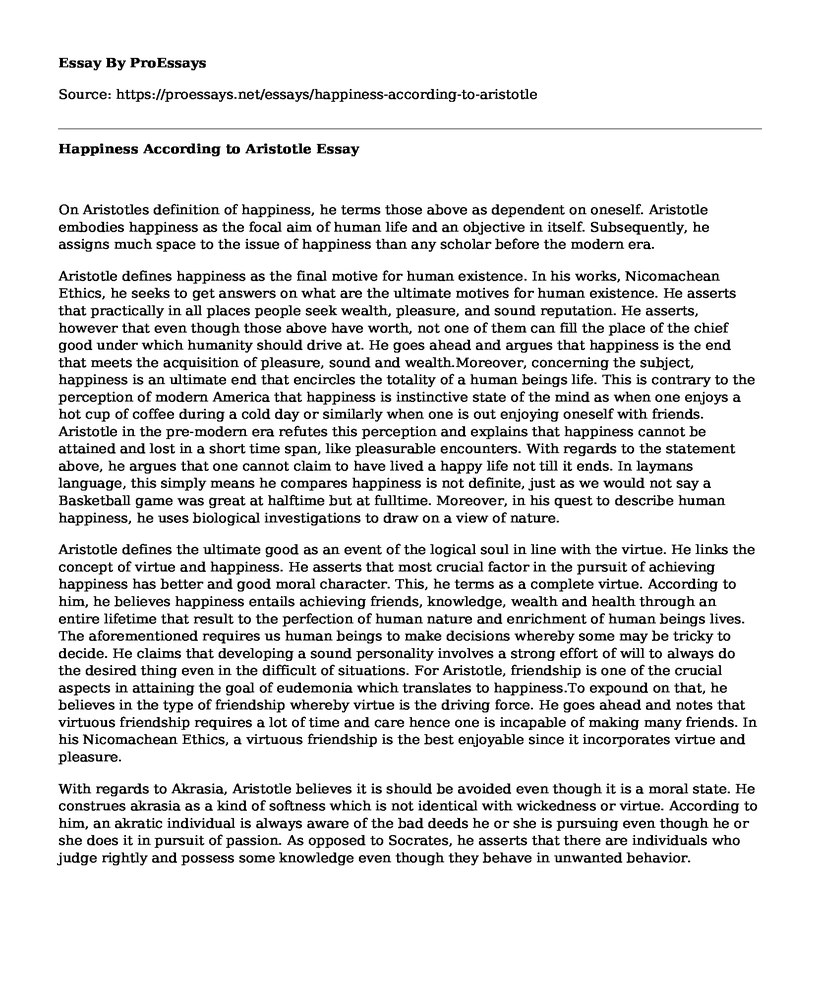On Aristotles definition of happiness, he terms those above as dependent on oneself. Aristotle embodies happiness as the focal aim of human life and an objective in itself. Subsequently, he assigns much space to the issue of happiness than any scholar before the modern era.
Aristotle defines happiness as the final motive for human existence. In his works, Nicomachean Ethics, he seeks to get answers on what are the ultimate motives for human existence. He asserts that practically in all places people seek wealth, pleasure, and sound reputation. He asserts, however that even though those above have worth, not one of them can fill the place of the chief good under which humanity should drive at. He goes ahead and argues that happiness is the end that meets the acquisition of pleasure, sound and wealth.Moreover, concerning the subject, happiness is an ultimate end that encircles the totality of a human beings life. This is contrary to the perception of modern America that happiness is instinctive state of the mind as when one enjoys a hot cup of coffee during a cold day or similarly when one is out enjoying oneself with friends. Aristotle in the pre-modern era refutes this perception and explains that happiness cannot be attained and lost in a short time span, like pleasurable encounters. With regards to the statement above, he argues that one cannot claim to have lived a happy life not till it ends. In laymans language, this simply means he compares happiness is not definite, just as we would not say a Basketball game was great at halftime but at fulltime. Moreover, in his quest to describe human happiness, he uses biological investigations to draw on a view of nature.
Aristotle defines the ultimate good as an event of the logical soul in line with the virtue. He links the concept of virtue and happiness. He asserts that most crucial factor in the pursuit of achieving happiness has better and good moral character. This, he terms as a complete virtue. According to him, he believes happiness entails achieving friends, knowledge, wealth and health through an entire lifetime that result to the perfection of human nature and enrichment of human beings lives. The aforementioned requires us human beings to make decisions whereby some may be tricky to decide. He claims that developing a sound personality involves a strong effort of will to always do the desired thing even in the difficult of situations. For Aristotle, friendship is one of the crucial aspects in attaining the goal of eudemonia which translates to happiness.To expound on that, he believes in the type of friendship whereby virtue is the driving force. He goes ahead and notes that virtuous friendship requires a lot of time and care hence one is incapable of making many friends. In his Nicomachean Ethics, a virtuous friendship is the best enjoyable since it incorporates virtue and pleasure.
With regards to Akrasia, Aristotle believes it is should be avoided even though it is a moral state. He construes akrasia as a kind of softness which is not identical with wickedness or virtue. According to him, an akratic individual is always aware of the bad deeds he or she is pursuing even though he or she does it in pursuit of passion. As opposed to Socrates, he asserts that there are individuals who judge rightly and possess some knowledge even though they behave in unwanted behavior.
Cite this page
Happiness According to Aristotle. (2021, Mar 14). Retrieved from https://proessays.net/essays/happiness-according-to-aristotle
If you are the original author of this essay and no longer wish to have it published on the ProEssays website, please click below to request its removal:
- Psychotic Disorder: Schizophrenia Essay
- Why I Am Interested in Being a Physician Assistant Essay
- Ethical Issues: Non-Monogamy Relationship Essay Example
- Essay Example on Marxism: Exploring Social Development and Human Nature
- Under-Five Mortality: Impact on Child Growth - Research Paper
- Essay Sample on Define Epistemology: Types of Philosophical Questions Addressed
- Blame and Forgiveness - Research Paper Sample







